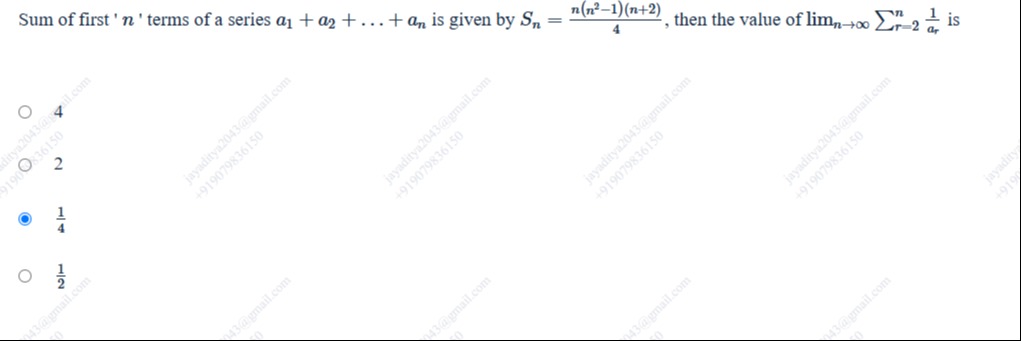Question
Question: Sum of first 'n' terms of a series $a_1 + a_2 + ... + a_n$ is given by $S_n = \frac{n(n^2-1)(n+2)}{4...
Sum of first 'n' terms of a series a1+a2+...+an is given by Sn=4n(n2−1)(n+2), then the value of limn→∞∑r=2nar1 is

4
2
41
21
41
Solution
The sum of the first 'n' terms of the series is given by Sn=4n(n2−1)(n+2). We can rewrite Sn as Sn=4n(n−1)(n+1)(n+2).
The nth term of the series, an, for n≥2 is given by an=Sn−Sn−1.
an=4n(n−1)(n+1)(n+2)−4(n−1)((n−1)2−1)((n−1)+2)
an=4n(n−1)(n+1)(n+2)−4(n−1)(n2−2n)(n+1)
an=4n(n−1)(n+1)(n+2)−4n(n−1)(n−2)(n+1)
Factor out the common terms 4n(n−1)(n+1):
an=4n(n−1)(n+1)[(n+2)−(n−2)]
an=4n(n−1)(n+1)[n+2−n+2]
an=4n(n−1)(n+1)[4]
an=n(n−1)(n+1) for n≥2.
The sum we need to evaluate is ∑r=2nar1. For r≥2, ar=r(r−1)(r+1).
We need to evaluate the sum Tn=∑r=2nr(r−1)(r+1)1.
We use partial fraction decomposition for the term (r−1)r(r+1)1.
(r−1)r1−r(r+1)1=(r−1)r(r+1)(r+1)−(r−1)=(r−1)r(r+1)2.
So, (r−1)r(r+1)1=21[(r−1)r1−r(r+1)1].
Now we can write the sum Tn:
Tn=∑r=2n21[(r−1)r1−r(r+1)1]
Tn=21∑r=2n[(r−1)r1−r(r+1)1]
This is a telescoping sum. The sum is 21∑r=2n[g(r)−g(r+1)].
Summing these terms, the intermediate terms cancel out:
∑r=2n[g(r)−g(r+1)]=[g(2)−g(3)]+[g(3)−g(4)]+...+[g(n)−g(n+1)]=g(2)−g(n+1).
g(2)=(2−1)21=1⋅21=21.
g(n+1)=((n+1)−1)(n+1)1=n(n+1)1.
So, the sum Tn=21[g(2)−g(n+1)]=21[21−n(n+1)1].
We need to find the limit of this sum as n→∞:
limn→∞Tn=limn→∞21[21−n(n+1)1].
As n→∞, n(n+1)→∞, so n(n+1)1→0.
limn→∞Tn=21[21−0]=21⋅21=41.
The final answer is 41.
